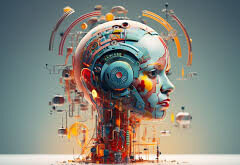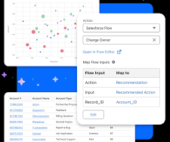Salesforce predicts you will have deployed over 100 AI Agents by the end of the year. What are they? What do they do? Why do you need them? Let’s explore the 5 key attributes of AI Agents.
- Role or Persona
- Agent topics and instructions
- Data
- What knowledge they can access
- Actions
- What capabilities do they have
- Guardrails
- What shouldn’t they do
- Channel
- Where do they work
What Is an AI Agent?
An AI agent is an intelligent software system that uses artificial intelligence to autonomously pursue goals and complete tasks on behalf of users. Unlike traditional programs, AI agents exhibit reasoning, planning, memory, and decision-making abilities, allowing them to learn, adapt, and operate with minimal human intervention.
These agents leverage generative AI and foundation models to process multimodal inputs—such as text, voice, video, and code—enabling them to:
✔ Understand and analyze information
✔ Make logical decisions
✔ Learn from interactions
✔ Collaborate with other agents
✔ Automate complex workflows
From customer service bots to autonomous research assistants, AI agents are transforming industries by handling tasks that once required human intelligence.
Key Features of an AI Agent
Modern AI agents go beyond simple automation—they possess advanced cognitive and interactive capabilities:
| Feature | Description |
|---|---|
| Reasoning | Uses logic to analyze data, solve problems, and make decisions. |
| Acting | Executes tasks—whether digital (sending messages, updating databases) or physical (controlling robots). |
| Observing | Gathers real-time data via sensors, NLP, or computer vision to understand its environment. |
| Planning | Strategizes steps to achieve goals, anticipating obstacles and optimizing actions. |
| Collaborating | Works with humans or other AI agents to accomplish shared objectives. |
| Self-Refining | Continuously improves through machine learning and feedback. |
AI Agents vs. AI Assistants vs. Bots
While all three automate tasks, they differ in autonomy, complexity, and learning ability:
| Aspect | AI Agent | AI Assistant | Bot |
|---|---|---|---|
| Purpose | Autonomously performs complex tasks. | Assists users with guided interactions. | Follows pre-set rules for simple tasks. |
| Autonomy | High—makes independent decisions. | Medium—requires user input. | Low—limited to scripted responses. |
| Learning | Adapts and improves over time. | May learn from interactions. | Minimal or no learning. |
| Interaction | Proactive and goal-driven. | Reactive (responds to user requests). | Trigger-based (e.g., chatbots). |
Example:
- An AI agent in healthcare might autonomously diagnose patients by analyzing medical records.
- An AI assistant (like Siri) helps users set reminders or answer questions.
- A bot in customer service routes queries based on keywords.
How Do AI Agents Work?
AI agents operate through a structured framework:
- Persona – Defines its role, behavior, and communication style (e.g., a “financial advisor” agent vs. a “customer support” agent).
- Memory – Uses:
- Short-term memory for immediate tasks.
- Long-term memory for historical data.
- Episodic memory to recall past interactions.
- Tools – Integrates external resources (APIs, databases, sensors) to execute tasks.
- Model – Powered by large language models (LLMs) for reasoning and language processing.
Types of AI Agents
AI agents can be classified based on interaction style and collaboration level:
1. By Interaction
- Interactive Partners (Surface Agents)
- Engage in conversations (e.g., chatbots, virtual assistants).
- Used in customer service, healthcare, and education.
- Autonomous Background Agents
- Operate without direct human input (e.g., fraud detection, supply chain optimization).
2. By Number of Agents
- Single Agent – Works alone (e.g., a personal AI scheduler).
- Multi-Agent Systems – Multiple agents collaborate or compete (e.g., autonomous trading algorithms).
Benefits of AI Agents
✅ 24/7 Automation – Handles repetitive tasks without fatigue.
✅ Enhanced Decision-Making – Analyzes vast data for insights.
✅ Scalability – Manages workflows across industries.
✅ Continuous Learning – Improves performance over time.
The Future of AI Agents
As AI advances, agents will become more autonomous, intuitive, and integrated into daily workflows—from healthcare diagnostics to smart city management.
Want to see AI agents in action? Explore 300+ real-world AI use cases from leading organizations.














